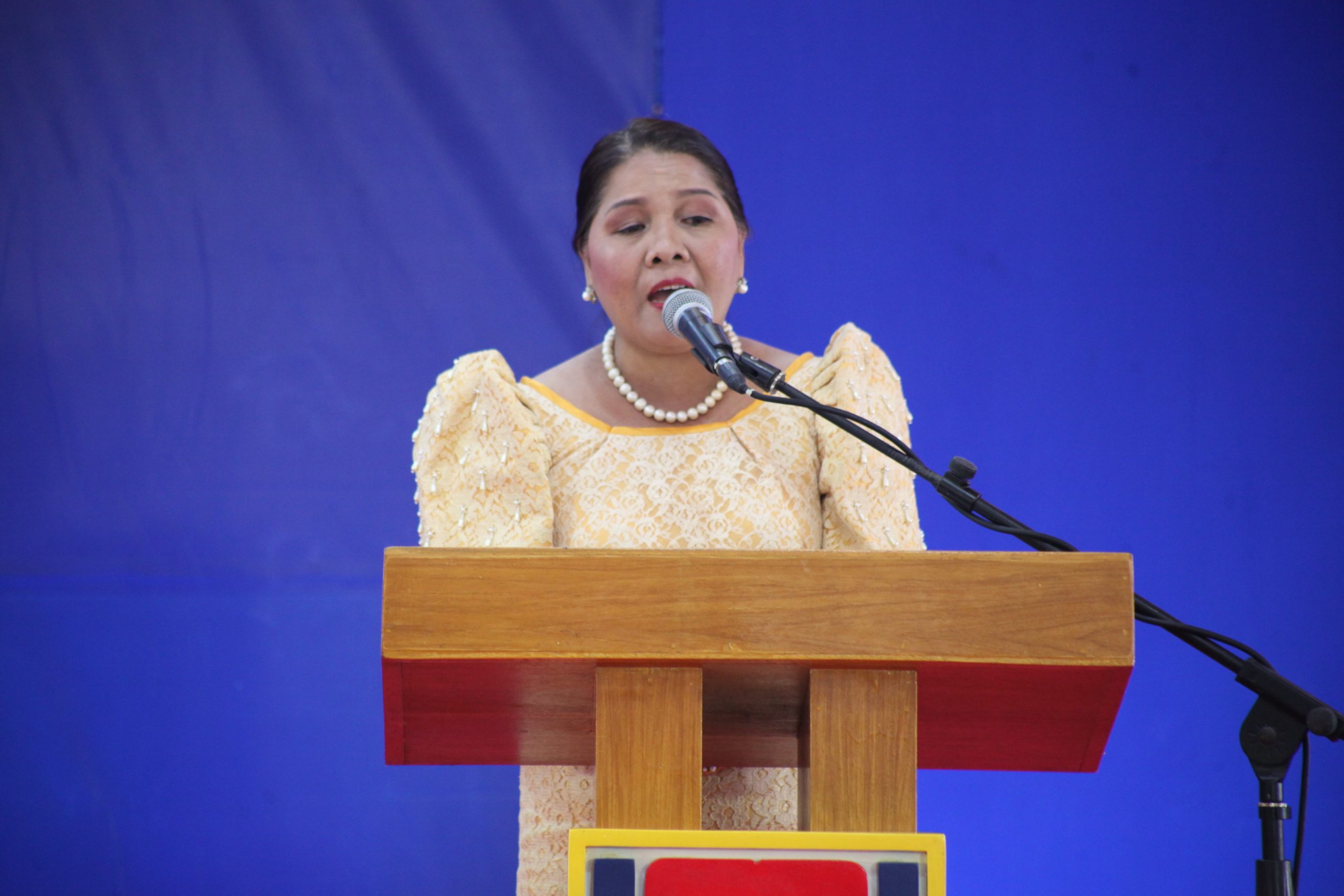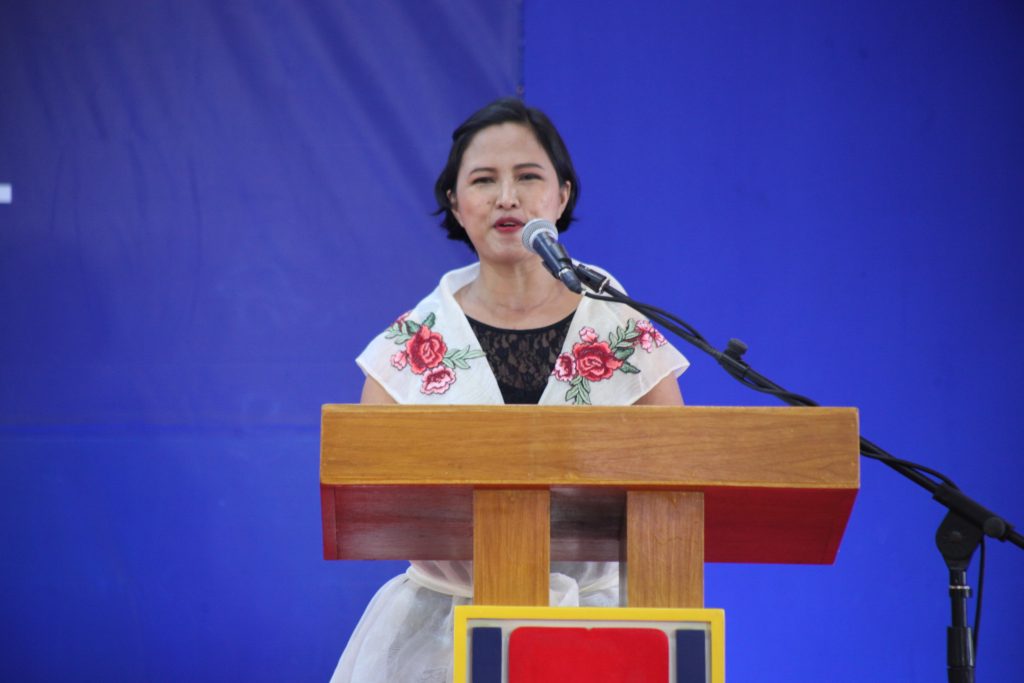Five household-beneficiaries of the Department of Social Welfare and Development’s (DSWD) Pantawid Pamilyang Pilipino Program (4Ps) from Metro Manila whose lives have improved based on the assessment conducted by DSWD have met President Rodrigo R. Duterte during the Agency’s 69th Founding Anniversary culminating activity held on January 29.
The household-beneficiaries included the Mendiola family from Taguig City, Maata family from Pasig City, the Oli family from Caloocan City, and the Dela Cruz and Malate families from Quezon City who have all attained the self-sufficiency level of well-being and are now ready to exit from the program.
In September last year, DSWD launched the nationwide assessment of 4Ps to check the improvement in the lives of the beneficiaries using the Social Welfare and Development Indicators (SWDI) tool. Under this tool, the households’ well-being is measured as either Survival, Subsistence, or Self-sufficiency.
Households categorized as living under survival are those that cannot provide for their basic needs such as food and clothing. On the other hand, households under the subsistence level are those whose basic needs are met but are still considered as very vulnerable.
Meanwhile, households who are assessed as self-sufficient have the capacity to provide for their basic needs, stable income generated from either a permanent job or small business, ability to send their children to school, and are prepared to protect their households from sliding back to poverty.
The information gathered during the assessment will be used as basis to determine the readiness of the households to eventually graduate from the program. This will also help in identifying other services or interventions that they need as they graduate. The assessment targets 3.7 million 4Ps household-beneficiaries and will be finished by the first quarter of 2020.
4Ps is the country’s flagship poverty alleviation program being implemented by DSWD. It invests in human capital development and in the health and education of poor households, particularly of children aged 0-18 years old. 4Ps uses the conditional cash transfer scheme to provide cash grants to the beneficiaries who comply with the program conditionalities.
Through the years, 4Ps has improved the lives of its beneficiaries, helping them meet their basic household needs. Twelve years since its inception in 2008, the program continues to alleviate the lives of poor Filipinos towards their improved well-being and contributes to helping the government realize its goal of eradicating poverty.
Surviving and thriving as a single mom
In the Philippines, a family is usually composed of a mother, father, and children. But for some reasons, there are families that are left under the care of either one of the parents, grandparents, or other relatives.
Such is the family story of Margie V. Maata, 49, who was raised in a small town in Oroquieta City, Misamis Occidental. She moved to Manila to continue her college education and stayed with her siblings in Pasig. Unfortunately, she was unable to finish her studies, as she got pregnant with her first child.
After getting married, Margie’s family relocated to Lupang Arienda, Antipolo, Rizal. While starting to build a home, Typhoon Ondoy washed away their house together with their dreams.
With nowhere to go, they decided to return to Barangay Kalawaan, Pasig City and stayed with her sister for two weeks while they rebuild their house in Antipolo.
Using scrap materials, they were able to build a makeshift house. Later on, her husband landed a job overseas. However, their relationship eventually ended, so Margie was left with the sole responsibility of taking care of their children.

In 2008, Margie’s family was among those listed as qualified beneficiaries of 4Ps. With the help of the program, Margie was able to send her children to school. Her eldest son, Gerald, who is a graduate of Marine Technology, now works in a Business Process Outsourcing (BPO) company while he looks for opportunities to work abroad. Her eldest daughter, Sherwin Mae, is also a regular employee of a private company.
Her two younger daughters, Janine Krisha, 20, and Cristina Paula, 17, are in college and Grade 11, respectively. Cristina Paula is being monitored by 4Ps.
“Dahil dito (4Ps), napagtapos ko sa pag-aaral ang aking mga anak hanggang kolehiyo at aking ipagmamalaki na kailanman ay hindi sila magiging sakit ng lipunan. Bagkos, sila ay nakakatulong ngayon sa aking pamilya at sa pamayanan,” Margie shared during the presentation of the 2019 accomplishments of 4Ps which was held before the arrival of the President on January 29.
She added that her family received numerous assistance from the government and that in return, she continued to persevere in life.
“Umaasa po ako na sana ay mas marami pang maging katulad ko, si Margie, solo parent, matapang na sinuong ang hamon ng buhay at naniniwala, ang kahirapan kailannman ay hindi hadlang upang mapagtagumpayan ang ating adhikain sa buhay,” Margie said in her speech.
Reaping the fruit of hard labor

The Mendiola family, on the other hand, became part of the program in 2009. Prior to being a beneficiary of 4Ps, the family shared their experience of having difficulties in making both ends meet.
The cash grants that the Mendiola family received from the program were used mostly to meet the educational needs of the children. As a 4Ps member, the family has realized the value of education and health, which were not their priority then. At present, all the five children of the family are studying, with only one child being monitored by 4Ps.
Clarissa, 37, the mother of the family, shared that the monthly Family Development Sessions (FDS) of 4Ps has made an impact in their lives.
“Ang buwanang pagpupulong ay nagkaroon ng malaking epekto sa aking pamilya. Dahil sa FDS, mas naging aktibo kami sa gawain ng aming pamayanan at mas natutunan naming maglaan ng oras upang sama-samang kumain,” she shared.
FDS is a platform for delivering key knowledge or information that empower poor households so they could adequately respond to the needs of their family members. It also fosters deeper social awareness and promotes active community development and participation.
The monthly FDS has also helped the Mendiola family handle their finances better. “Natutunan din ng aming pamilya ang mangasiwa ng salapi o pera at mag-impok o mag-save para sa maaring paglaanan sa hinaharap,” Clarissa added.
Currently, Clarissa works as a laundrywoman. She has six regular employers and earns P15,000 monthly. She is also an on-call housekeeper earning P500 per housekeeping job that she takes. Meanwhile, her husband is a tricycle driver. The Mendiola family also owns three tricycle units for hire which serve as the family’s main source of income. With the combined income from the family’s efforts, Nanay Clarisa fondly shared that they were able to save money.
“Taos puso po akong nagpapasalamat na kami ay naging bahagi ng 4Ps sa loob ng sampung taon. Malaki po ang naitulong ng programa sa akin bilang isang ina…Naging malaking tulong ang mga natatanggap namin kada dalawang buwan na cash grant mula sa programa, lalong-lalo na sa pagsuporta sa pag-aaral ng aking mga anak,” Clarissa said during the event.
She added that their family is now ready to graduate from the program to give the same opportunity to others who are also in need of government assistance.
“Bilang isang miyembro ng programa sa loob ng sampung taon, masasabi ko na ako ay handa nang grumaduate sa programa upang mabigyan ng oportunidad na mapabilang ang iba pang katulad ko na nangangailangan,” Clarissa said.
Expanded benefits
4Ps was passed into law in 2019. As the program is now institutionalized, it becomes the government’s national poverty reduction strategy.
Among the changes in the program is the higher cash grants for health and education. Households that are compliant to the health conditionalities will now receive P700 from P500. Meanwhile, children enrolled in the senior high school and complying with the education conditions will also receive P700 each.
Under the law, program beneficiaries will now only be covered for a maximum of seven years. These households will be closely monitored using the social case management process. The law also provides for the programs and services that may be availed by the beneficiaries, with the end goal of allowing them to stand in their own two feet. Among these services are access to stable jobs, sustainable livelihoods, and capability building, among others. The program will also prioritize the beneficiaries’ financial literacy for them to better manage their finances and teach them to save for future needs or emergencies.
Giving poor families a fighting chance to break away from the intergenerational cycle of poverty is a commitment that the Philippine government has been continuously upholding through 4Ps.
DSWD commits to continuously work with fellow national government agencies and other stakeholders to empower the poor and win the battle of reducing poverty incidence to 14 percent by 2022. ###
